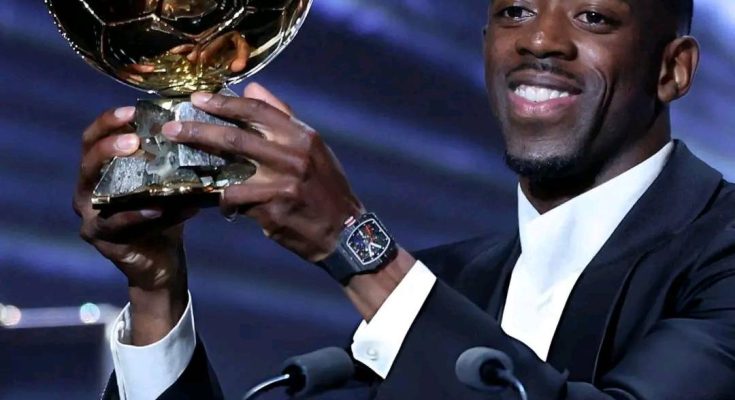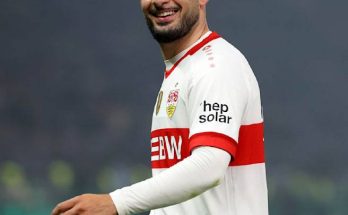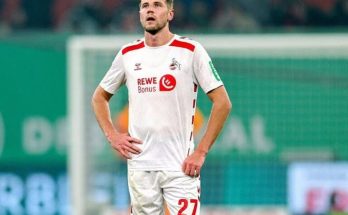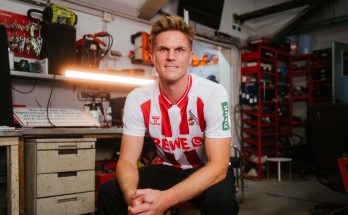Ousmane Dembélé’s career has always been a story of dazzling flair, unpredictable turns, and extraordinary moments of brilliance. In 2025, he reached the pinnacle of individual recognition when he was awarded the Ballon d’Or, cementing his place among football’s greats. For many, the accolade was the culmination of a career that had promised greatness from the very beginning, even through the obstacles, injuries, and doubts that clouded parts of his journey. The Frenchman, who first announced himself on the world stage with Borussia Dortmund, has now joined the likes of Lionel Messi, Cristiano Ronaldo, Luka Modrić, and Karim Benzema as a Ballon d’Or winner, and in doing so, he used the stage to pay tribute to the German club that played such a vital role in shaping his destiny.
When the announcement came, the footballing world erupted with mixed emotions. Fans and pundits alike celebrated the fact that one of the most gifted dribblers and creators of his generation was finally recognized as the best player in the world. Others reflected on how unpredictable this outcome seemed just a few years ago, when Dembélé’s career at Barcelona had been hampered by injuries and inconsistency. Yet the 2025 version of Dembélé is not just the talented but raw youngster who left Rennes for Dortmund in 2016, nor the struggling player fighting for consistency in Spain. He is now the fully matured leader of France’s attacking line, a world-class performer at club level, and the face of French football’s newest golden generation.
This triumph is all the more symbolic given how his career almost spiraled into uncertainty after his blockbuster move to Barcelona in 2017. The €105 million fee, then one of the most expensive transfers in history, brought enormous pressure. His spell at the Camp Nou was marred by a series of injuries that often kept him sidelined for months. At one point, fans wondered if his career would ever live up to its early promise. But through resilience, improved discipline, and the support of his teammates and coaches, Dembélé slowly rebuilt his reputation, eventually becoming indispensable not only for his club but also for Didier Deschamps’ France squad.
What stands out about his Ballon d’Or season is the consistency that had long eluded him. No longer defined by raw potential alone, Dembélé added maturity to his game. His dribbling remained electric, his pace devastating, and his creativity unmatched, but he combined those gifts with an improved tactical awareness. He contributed double figures in both goals and assists at club level while also shining at the highest stages of international football. His performances in the Champions League, where he tore apart defenses with his unique blend of speed and technical wizardry, made the difference in decisive knockout games. For France, his contributions in international tournaments reminded the world of the special talent he is, complementing Kylian Mbappé and Antoine Griezmann with his unpredictability and precision.
When he stepped onto the podium to lift the Golden Ball, Dembélé’s acceptance speech was as emotional as it was reflective. He acknowledged his family, teammates, and coaches, but most importantly, he mentioned Borussia Dortmund as the club that laid the foundation for everything he has become. For Dembélé, Dortmund was more than a stepping stone. It was the club that gave him the freedom to express himself, the stage to showcase his creativity, and the belief that he could take on the best defenders in Europe. Under Thomas Tuchel’s management at the time, Dembélé flourished, combining with Pierre-Emerick Aubameyang in a partnership that terrorized Bundesliga defenses. His iconic performances in the black and yellow shirt are still remembered fondly by Dortmund fans, especially his heroics in the 2017 DFB-Pokal final, where he scored a brilliant goal to help the club lift the trophy.
Those memories came rushing back as he spoke about the influence Dortmund had on his development. He admitted that without the faith shown in him at such a young age, his career might have taken a very different path. Dortmund’s emphasis on nurturing young talent, giving them responsibility early, and creating an environment where creativity thrives, allowed Dembélé to transition from a promising teenager at Rennes to a world-class talent capable of holding his own against Europe’s elite. He singled out the club’s fans as well, mentioning the “Yellow Wall” as a source of inspiration during his formative years. The passion and energy inside Signal Iduna Park, he said, gave him the confidence to try things, to take risks, and to never lose belief in his unique style.
The recognition of Dortmund’s role is not just a sentimental nod; it highlights a broader truth about the club’s influence in European football. Borussia Dortmund has built a reputation for being a launchpad for world-class talent. From Robert Lewandowski to Jadon Sancho, from Erling Haaland to Jude Bellingham, the club has consistently provided the platform for young players to take their first steps toward superstardom. Dembélé’s acknowledgment reinforces that tradition, and it is no coincidence that many of today’s brightest stars look at Dortmund as the perfect environment to grow. For him, Dortmund was not simply a club—it was the crucible that forged the mentality needed to chase greatness.
Winning the Ballon d’Or is not just a recognition of individual talent; it is also about the narrative that surrounds a player’s career. Dembélé’s story is one of resilience, patience, and redemption. For years, he was spoken of as the “what if” player of his generation—what if he had stayed fit, what if he had fulfilled his promise, what if he had taken the right path earlier? In 2025, those “what ifs” were replaced with “he has.” He has overcome. He has delivered. He has reached the very top. The award does not erase the frustrations of his earlier years, but it does show that persistence pays off and that greatness can be delayed but not denied.
In France, the victory was celebrated as a continuation of the nation’s rich tradition of producing Ballon d’Or winners. From Raymond Kopa to Michel Platini, from Jean-Pierre Papin to Zinédine Zidane, and more recently Karim Benzema, France has a long and proud history with the award. Dembélé’s win reinforces the country’s influence on global football and ensures that the current generation remains in the spotlight. For French fans, his partnership with Kylian Mbappé represents one of the most dynamic attacking duos in world football, and the thought of them leading France into future tournaments fills the nation with hope.
For Dortmund supporters, Dembélé’s tribute was more than just words; it was validation. Despite the fact that his departure in 2017 was controversial—he forced a transfer to Barcelona in a saga that left a sour taste at the time—his acknowledgment shows maturity and respect for the club that gave him his first major chance. It heals old wounds and allows fans to see him not as a player who left prematurely but as one who never forgot where he came from. The Ballon d’Or stage gave him the opportunity to reconcile with his past and express gratitude, and that gesture will not be forgotten in Dortmund.
From a broader perspective, Dembélé’s success story also serves as inspiration for younger players who face setbacks early in their careers. It shows that even when things go wrong—injuries, dips in form, or career stagnation—there is always a way back through perseverance and hard work. His journey is not linear, but that makes it all the more relatable and inspirational. Many talented players have been lost to the demands and expectations of the modern game, but Dembélé’s triumph demonstrates that potential can be fulfilled even after years of adversity.
The Ballon d’Or win also sparks discussions about the state of modern football and how the definition of “the best player” has evolved. In the era dominated by Messi and Ronaldo, individual scoring records often determined the outcome. But in Dembélé’s case, his influence goes beyond goals. His ability to break down defenses, create space for teammates, and decide games with moments of brilliance redefines the value of creativity in football. He is not the player who scores 50 goals a season; he is the player who makes the 50 goals possible. That shift in recognition suggests a broader appreciation of artistry and influence over sheer statistics.
As celebrations continue, Dembélé’s focus will inevitably turn toward what comes next. Winning the Ballon d’Or is often seen as the pinnacle, but it can also be a starting point for even greater achievements. At 28 years old, he still has several years at the top of his game, and both his club and country will look to him as a leader moving forward. The challenge now is to sustain this level, to ensure that the 2025 Ballon d’Or is not seen as a one-off but as the first of multiple accolades in a career that has finally reached full bloom.
In many ways, Dembélé’s journey mirrors that of Borussia Dortmund itself—a story of highs and lows, resilience in the face of challenges, and the ability to inspire against all odds. His acknowledgment of Dortmund’s role is not just about the past; it is also a reminder of how the right environment can shape greatness. The black and yellow shirt will forever be part of his identity, even as he basks in the glory of being the best player in the world. And for football fans everywhere, his Ballon d’Or victory is proof that talent, when nurtured and combined with perseverance, can indeed conquer all obstacles.



